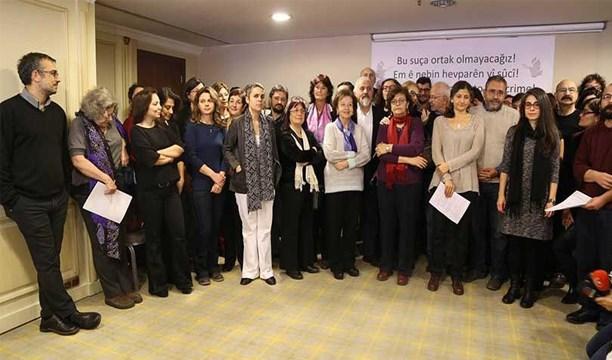The decision to prosecute scores of academics for signing a January 2016 petition criticizing the Turkish government’s actions in southeastern Turkey seriously violates the right to free speech and academic freedom, Human Rights Watch said today. The charges are also a misuse of terrorism laws.
The trials of academics start on December 5, 2017, and will continue over the following months. At least 146 academics from public and private universities in Istanbul will face individual and separate trial hearings for “spreading terrorist propaganda” on behalf of the armed Kurdistan Workers’ Party (PKK). New cases are expected to be opened against signatories of the petition.
“Nearly two years after signing a petition that calls for peace, academics are now standing trial for spreading terrorist propaganda.” said Hugh Williamson, Europe and Central Asia director at Human Rights Watch. “There is nothing in the petition to justify such an absurd charge and putting the academics on trial shows the Turkish government’s eagerness to set the criminal justice system against those who disagree with it.”
The identical accusations against each academic are outlined in a 17-page indictment, but each proceeding is to be separate and the prosecutor has not opted to indict all the academics in one process. The indictment claims that in signing the petition the academics were responding to a December 2015 call reported in Kurdish media by a senior commander from the PKK calling on “democrats and intellectuals” to support self-governance. There is no evidence of a link between the petition and an order from the armed group. The hearings for the academics are scheduled in some cases at 10 or 15-minute intervals in at least seven heavy penal courts.
The petition, initially signed by 1,128 academics calling themselves Academics for Peace and then by more than 1,000 more, declared “We will not be party to this crime.”The petition condemned the Turkish government’s security operations against the PKK youth movement in cities of southeast Turkey because of the disastrous impact of the operations on the Kurdish civilian population. The petition, made public at an Istanbul news conference on January 11, 2016, also called for a resumption of peace talks with the PKK.
In response, President Recep Tayyip Erdoğan strongly criticized the academics in at least five speeches – terming them vile, equal to terrorists, base, and dark – and demanding sanctions against them.
Four of the signatories were detained and prosecuted in 2016 after they held a second news conference. An Istanbul court sent the four to pretrial detention on March 15, 2016, pending the completion of a criminal investigation. They were charged with spreading terrorist propaganda, which carries a sentence of between one and five years. The Istanbul court released them at their first hearing on April 22, 2016, and said it would seek permission from the justice minister to try the four for “insulting state institutions” (Turkish Penal Code article 301) and postponed the case.
In mid-August 2017, the justice minister permitted the prosecution to continue under article 301, for which the penalty is six months to two years in prison. The fact that the four now face charges not of “spreading terrorist propaganda” but of “insulting state institutions” calls into the question the basis of the trials on terrorism charges that begin on December 5.
To date 380 academics who signed the declaration have been dismissed from their universities and barred from public service by state of emergency decrees, and another 83 have been dismissed without being barred.
“Academic freedom in Turkey is hanging by a thread,” Williamson said. “Academics should be free to teach and research without facing trumped up charges or dismissal for their peaceful expression.”










